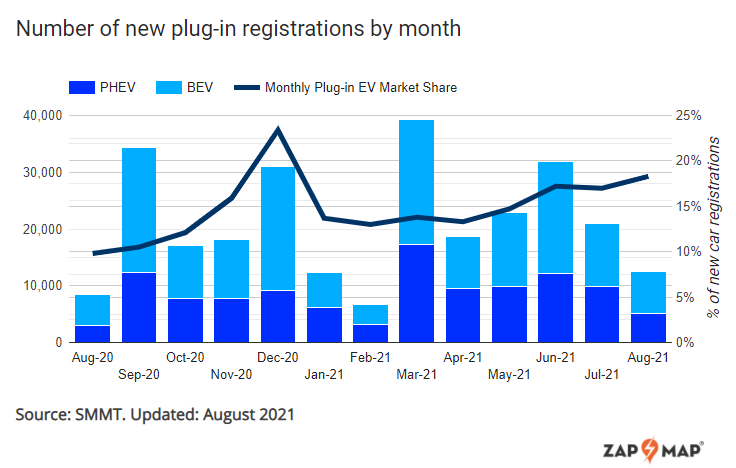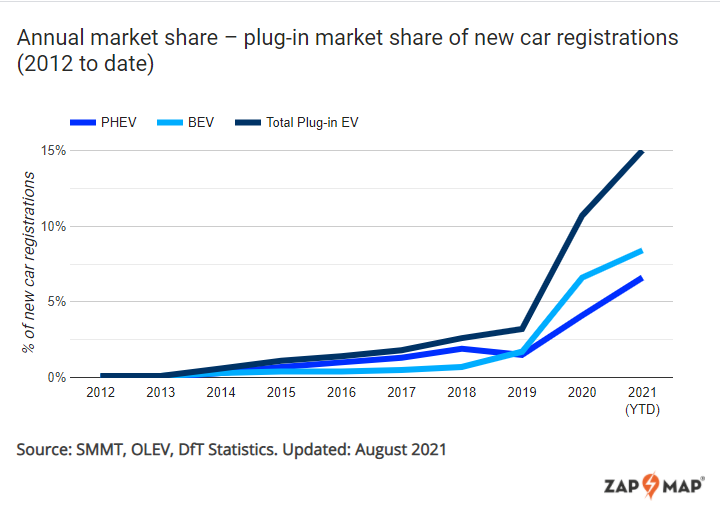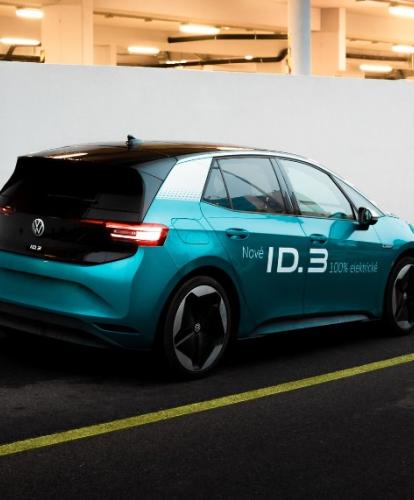New figures from the Society of Motor Manufacturers and Traders (SMMT) have today been released, detailing new car registrations in August. At a time of year when absolute numbers tend to be lower, August 2021 was a good month in terms of market share for plug-in vehicles, which have now reached 15% market share in 2021 year-to-date.
With plug-in sales performing well overall in 2021, last month was no different: sales of new plug-in cars made up 18.3% of overall vehicle sales in August.
Last month also saw sales of petrol and diesel cars drop significantly compared with August 2020. Petrol decreased by over 40% and diesel by nearly 65%. The continued increase in sales of mild hybrid electric vehicles is one to keep an eye on, however. (MHEV petrol vehicle sales increased 48.5% last month compared to last year.)
“Today’s data shows how Britain’s booming electric vehicle market is bucking the trend of widespread supply and staff shortages. But there are warning signs we should address now to ensure there are no barriers in the shift to clean transport,” said Melanie Shufflebotham, COO & Co-founder of Zapmap.
“Petrol and diesel cars are in permanent decline and we need to focus our attention on shifting investment to growing the UK’s EV manufacturing base.”

The chart above displays the number of registrations and the market share of plug-in vehicles each month over the past 13 months. As you can see, August 2021 saw a total of 12,437 new electric vehicle registrations, comprising 7,388 BEVs and 5,049 PHEVs.
This takes the cumulative total of plug-in vehicles on UK roads – as of the end of August 2021 – to over 600,000 (approx. 300,000 BEVs and 305,000 PHEVs). In terms of market share, plug-in sales were at 18.3% last month.

August 2021 was a good month in terms of market share for plug-in vehicles, which made up 18.3% of overall vehicle sales, up from 17.0% in July. As you can see in the graph above, this means they now represent 15% of market share in 2021 year-to-date. So far in 2021, BEVs represent 8.4% of market share, with PHEVs at 6.6%. The two figures have been increasing as the year progresses.
In tandem with the growth in plug-in vehicles, the UK’s EV charging infrastructure continues to expand. Only last week, Shell announced that it is aiming to install 50,000 ubitricity charge points in the UK by 2025. The London Borough of Lambeth has also been working with EV charging specialist Connected Kerb in a project to demonstrate how affordable, and accessible, public EV charging infrastructure can be deployed to tackle EV inequality and drive greater EV adoption amongst communities traditionally under-represented in the EV transition.



